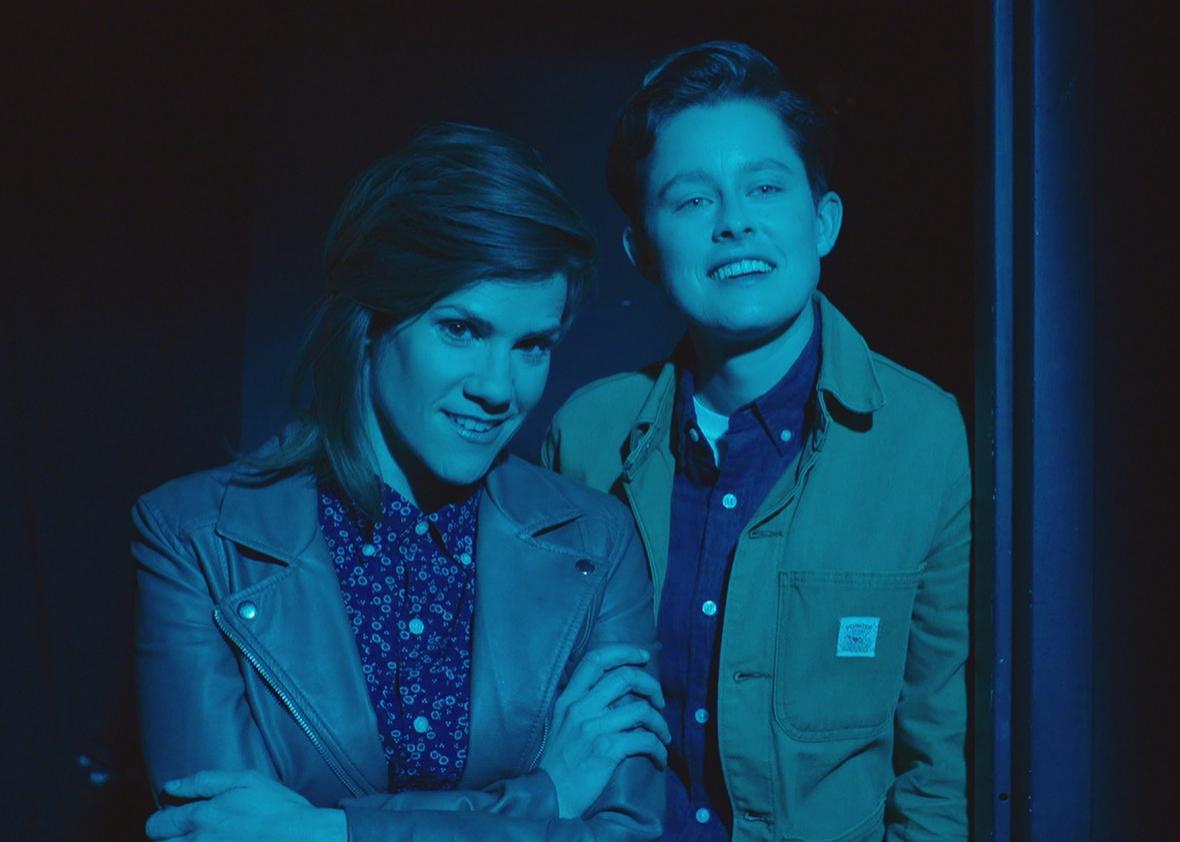It’s hard to pinpoint the exact moment when “standup comedian” became television’s most relatable profession, but it must be somewhere between Seinfeld making the comedy club seem like just another workplace and Maron restaging the WTF podcast’s revelatory interviews with comics. Of course, relatability requires viewers to see themselves in the shows’ neurotic comedy nerds, who thus far have mostly been white, straight, dudes.
That’s why Take My Wife, a new sitcom streaming on Seeso feels fresh, if not exactly revolutionary: Cameron Esposito and Rhea Butcher are struggling standup comedians who are also a lesbian couple—as are the real Cameron Esposito and Rhea Butcher, who play heightened versions of themselves in the show.
In Take My Wife, as in real life, Esposito is the more successful half of the couple: She has her own night at a Los Angeles comedy club; she gets asked to appear on comedy podcasts; she’s even the woman a movie star wants to shadow when she lands the part of a lesbian comic. Rhea, meanwhile, spends her days on soul-sucking graphic design work, stealing moments between logo tweaks to work on her standup material. Cameron and Rhea barely see each other since their schedules are out of synch, at least until Cameron convinces Rhea to give up her day job and try to make it as a comedian. Amazingly, professional jealousy doesn’t seem to be an issue. Sure, Rhea gets mad when Cameron forgets to introduce her to the bold-faced names who stop by the club, but that doesn’t seem like a reflection of rivalry, just a personal obliviousness on Cameron’s part. Rhea knows her place in the comedy hierarchy, and for the moment at least, her spot is a couple of rungs down from Cameron’s.
It’s still exciting and all too rare to see out, well-adjusted lesbians on television. These women are recognizably lesbian—and not just because of their haircuts. They’re also clearly a couple—and not just because we see them in bed together. (Though that is a pretty good clue.) The specifically sapphic moments are most obvious when they’re talking—or not talking—about money. Rhea is working-class and has no family members to underwrite her artistic ambitions, so while walking away from her day job is something she has to do if she’s serious about making it in comedy, it’s also terrifying. Cameron’s willingness to share her stuff is sweet, but it reveals a very lesbian dilemma: Where is the line between sharing resources and being dependent? Wearing each other’s clothes? (Fine. We all do that.) Sharing a toothbrush? (Only with one’s first live-in girlfriend and often under protest.) Sharing her computer when yours dies? (In a pinch, but better to have your own.) Letting her pay off your overdue student loans? (Really hard to take, especially for the more butch half of the couple, but it’s also hard to say no, especially when things get really bad.)
They’re also stand-up comics—which is a weird job, no matter how often we see it on TV. Working at night means spending days with only Twitter for company, and reading mean tweets about your act over lunch does nothing for your digestion. They spend hours and hours sitting around in green rooms, listening to fellow comedians unleash their ids. And it’s a business where connections are everything, so calling someone on a sexist, homophobic, or generally offensive comment can cost you a job. Take My Wife gently points out these peculiarities—and that usually gentle tone makes the serious moments, as when a string of actors break the fourth wall to acknowledge that they’ve been abused, all the more powerful.
Do six half-hours of gentle observational humor justify signing up for a new streaming service? It depends how many comedy podcasts are cued up on your phone. Or how much you want to see lesbians being lesbians. There’s a moment in the final episode when Rhea is finally able to tell Cameron something that she’s been struggling to say throughout the whole season. It makes sense that for this couple, the place where they can finally have a difficult conversation is on stage, with a whole bunch of people gawking, listening in, and occasionally even laughing at them.
